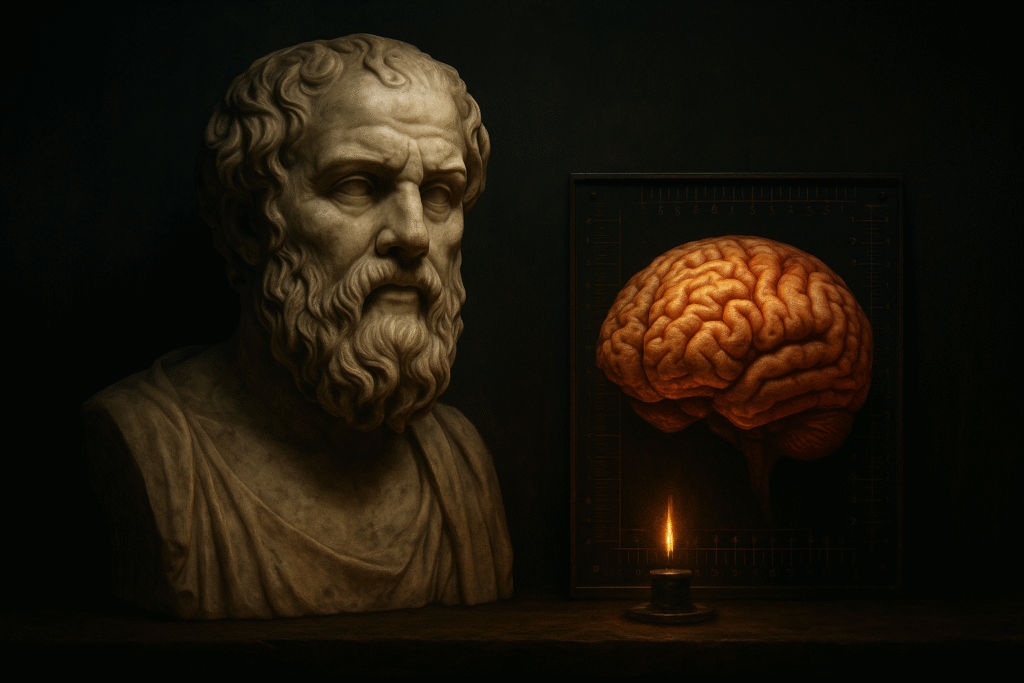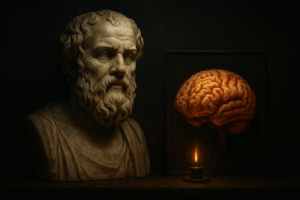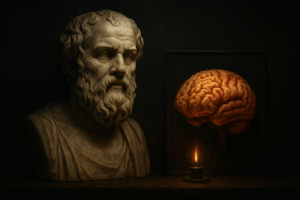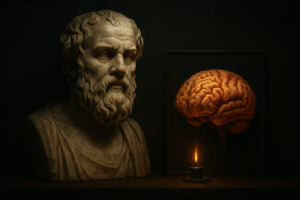
INTRODUCTION
Monday morning. Promise made: this time, it’ll work. But it doesn’t.
How many times have you sworn you’d change your life next Monday? Start going to the gym, write more, eat better, launch that project?
And how many times did that intention slip through your fingers like fine sand?
What if the problem isn’t you—but the invisible system behind your choices?
In this article, we’ll explore how small, repeated actions shape your identity more than big plans. We’ll connect modern neuroscience, Stoic philosophy, and James Clear’s Atomic Habits to understand—once and for all—how real change actually happens.
THE INVISIBLE POWER OF HABITS
Habits are silent votes cast for the kind of person you’re becoming.
Each time you work out, write, eat better, or meditate, you’re reinforcing an identity.
James Clear puts it this way: “Every action you take is a vote for the type of person you want to become.”
Seneca, two thousand years earlier, already said: “Life is long enough… if it is well lived.”
Ultimately, what we live is what we repeat.
THE REPEATING BRAIN: NEUROSCIENCE IN ACTION
Our brain loves to save energy. It turns repeated behaviors into automatic pathways.
Neuroscience calls this the habit loop: cue → craving → response → reward.
Studies from Harvard, Stanford, and MIT show that dopamine—the pleasure neurotransmitter—is not just released when you get a reward. It’s released when you anticipate the reward.
In other words: your brain craves to repeat what it already knows will feel good.
PHILOSOPHY KNEW THIS ALL ALONG
Before neuroscience, the ancients already understood: it’s in daily life that character is forged.
Aristotle wrote: “We are what we repeatedly do. Excellence, then, is not an act, but a habit.”
Epictetus, another Stoic, reminded us: “First, say to yourself what you would be; then do what you have to do.”
Ancient wisdom already grasped what science now confirms: alignment between intention and action is the foundation of transformation.
YOU ARE NOT WHAT YOU SAY — YOU ARE WHAT YOU DO
You can say you want to be a writer, an athlete, spiritual, or organized.
But your identity doesn’t come from your words—it comes from your small, quiet, everyday actions.
Identity is the sum of your repetitions.
If you want to be something, then act like it. Even for just two minutes.
It’s better to write one sentence than none.
Better to walk for 5 minutes than stay in bed.
Small is powerful when it’s consistent.
WHAT IF I GET LOST ALONG THE WAY?
It happens. Life gets in the way. Motivation fades.
But here’s a simple rule: never miss twice.
Skipping one day isn’t the problem. The problem is building a new habit of quitting.
Getting back on track quickly matters more than never failing.
And yes, boredom is normal. Mastery is won by those who fall in love with repetition.
REFLECTION IS THE HABIT THAT KEEPS HABITS ALIVE
Creating a review system is essential. James Clear does an annual and a midyear review.
Leaders, athletes, artists, and entrepreneurs use journals, check-ins, or reflection rituals.
Reflecting helps you course-correct and avoid running on autopilot.
Simple questions like:
– What worked?
– What didn’t work?
– What do I want to keep?
can open inner clarity.
CONCLUSION
Your habits shape you more than your dreams.
Each small, repeated act moves you closer to a version of yourself.
What you do silently, day after day, is shaping who you’ll become six months from now.
So:
Think less about goals. Think more about systems.
Think less about the “big leap,” and more about the “steady step.”
As Seneca said:
“Haste is the enemy of lasting progress.”
Final question:
What small habit is shaping the person you are becoming—right now?





